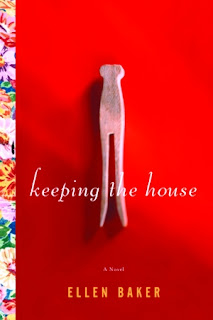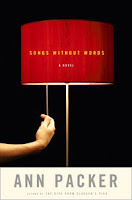July, 2007 - 544 pages - $24.95

Keeping the House is the story of one family living in a small Wisconsin town. The primary drive of the story are the arrivals of two brides to the city of Pine Rapids. In 1896, fresh out of college, Wilma arrives, a bride-to-be for a man she's not yet met and promptly falls in love with the wrong man -- the brother of the man she's supposed to Mary. The other, Dolly Magnuson arrives in 1950. Unlike Willma, Dolly arrives having already married the man she wanted to desperately. The remainder of the book follows the forward and audacious Dolly into like as a house wife as she reclaims the family house that has not been lived in.
Ellen Baker has written a very good first novel which, she has informed me just today, has been selected by the Chicago Tribune as one of the Best Books of 2007. Ellen has been helpful and kind throughout this process, I would definitely recommend this books.
Kelly Hewitt: Your book, Keeping the House, takes place in a town called Pine Rapids -- a small town in Wisconsin. Your bio says that you lived in a number of states: Minnesota, Illinois, South Dakota and Wisconsin. What lead you to choose Wisconsin for a setting and not one of the other states you've lived in?
Ellen Baker: I started writing about some of the characters who ended up in Keeping the House – the Mickelson family – the summer after my junior year of college. I had just moved to a new area of Wisconsin for a summer job and I was fascinated by its uniqueness; I ultimately wrote a whole novel about the family spending a summer there in 1919. I had always imagined that the family’s year-round home was in central Wisconsin. Some years later, when I decided to shelve that novel and expand the family’s story to span fifty years, I found that most of the action needed to be set in that year-round home, so Pine Rapids grew from just an idea of a place on the map to a “real” little town, modeled after several of the towns in that area of Wisconsin. (The family’s summer home in Stone Harbor, Wisconsin, does show up in a couple of scenes in Keeping the House, too.)
Kelly: Keeping the House is story that spans a total of three generations and two World Wars. How did your background as a WW II museum curator help when writing the segments of the book?
 Ellen: The veterans I met while I was working at the museum were the greatest help to my writing. By interviewing them about their experiences and just talking with them on a daily basis, I was able to come to understand their attitudes, values, mindsets, and the times they lived through. I’ve been so gratified to hear some (age 60 and under) readers comment that reading Keeping the House has helped them to understand their own parents and/or grandparents better than they ever were able to before. Also extremely gratifying are the comments from the 85-year-old readers who say, “You got it exactly right!”
Ellen: The veterans I met while I was working at the museum were the greatest help to my writing. By interviewing them about their experiences and just talking with them on a daily basis, I was able to come to understand their attitudes, values, mindsets, and the times they lived through. I’ve been so gratified to hear some (age 60 and under) readers comment that reading Keeping the House has helped them to understand their own parents and/or grandparents better than they ever were able to before. Also extremely gratifying are the comments from the 85-year-old readers who say, “You got it exactly right!”Kelly: I have to say that your website is pretty amazing. There are some really great Keeping the House resources. Can you tell our readers a bit about what sorts of things they can find there?
Ellen: You’ll find the first chapter of Keeping the House, discussion questions (for your book group!), the “story behind the book” and an essay on writing (describing my writing process and how Keeping the House came to be), a Mickelson family tree to click on for more information about each of the characters, and reviews of the book. There’s also a “bookshelf,” where I write about books I’ve read and loved lately, a listing of all my events and appearances, a place to send me email, and a “letters” page with something new from me each month. Then there’s a page of some of the great 1950s recipes mentioned in Keeping the House (no, I haven’t tried making any of them myself…) and, of course, bunches of links so you can choose your favorite retailer and buy Keeping the House!
Kelly: Dolly Magnuson is a great character. A brand new bride in a small town she's striving to be the ideal woman and the perfect wife. That's not where Dolly ends, when she discovers an abandoned house the reader sees just how determined and insatiable she can be. Is there anyone in your life that you draw on as an inspiration for this character?
Ellen: No, not really. I actually had written much of the Mickelsons’ story before Dolly ever came on the scene, so when she did (with the purpose of being the person to whom the story was going to be told) I knew I needed a character who would be, as you say, determined and insatiable. Sometimes characters take a long time to become “real” in my mind, but Dolly seemed full and real right from the start. I had been working with the Mickelsons for something like eight years before Dolly showed up; within a year the book was done. The entire time I was writing about her I thought she was nothing like me; after I was done, I realized she’s the most like me of any of the characters, though she is a bit more foolishly brave than I am! (I would never break into anyone’s house, for example, even if the door was unlocked…)
Kelly: Do you do a lot of personal reading? What was the last book you read?
 Ellen: Yes, I read all the time, usually one or two novels a week, and an occasional non-fiction book (memoir or history, usually). While writing Keeping the House, I was also working part-time as a bookseller, which was great; I loved getting excited about a book and telling everyone they just had to read it! The last book I read was Songs Without Words by Ann Packer, which I thought was quite wonderful. (To see my interview with Ann Packer, author of Songs Without Words, click here.)
Ellen: Yes, I read all the time, usually one or two novels a week, and an occasional non-fiction book (memoir or history, usually). While writing Keeping the House, I was also working part-time as a bookseller, which was great; I loved getting excited about a book and telling everyone they just had to read it! The last book I read was Songs Without Words by Ann Packer, which I thought was quite wonderful. (To see my interview with Ann Packer, author of Songs Without Words, click here.)Kelly: I read that you have worked as a costumed living history interpreter, it sounds really interesting. What does that entail?
Ellen: I’ve worked at two different living history jobs. The first was at a working 1850 farm (“The Homeplace”) on the Tennessee-Kentucky border, where I dressed in an 1850s farmwife costume and, along with a “family” of other interpreters, demonstrated the lifestyle of that place and time. The men grew tobacco and tended animals (oxen, horses, sheep, pigs, chickens) and the women mostly stayed at the house and cooked, gardened, and did handwork. Our first job was to “interpret” what we were doing to any tourists/visitors, but there were some quiet, cold autumn afternoons when we’d sit by the fire knitting and gossiping for hours without interruption. I learned how to cook full meals on a woodstove, quilt by hand, make candles and sauerkraut and sausage, and knit mittens. At this site we did “third-person” interpretation so I was always myself, a college graduate from Minnesota/Wisconsin, so, although I was dressed in costume, I could speak comfortably about what “people would have done” in 1850. (One of the most memorable comments I received: “You wouldn’t have nice teeth like that, if you really were living in 1850.”) My next living history job was at Historic Fort Snelling in Minneapolis. This job involved “first-person” interpretation, which is a bit like acting, but without a script. You have to internalize the lifestyle and speak as though you are really living it. The male interpreters were soldiers and officers and the women portrayed laundresses (who were lower class wives of enlisted men) or officer’s wives. One of the characters I remember portraying was Mrs. Green, an officer’s wife whose only child had recently died. After talking about my dead son all day, I would feel quite melancholy, even after I changed into my modern clothes and hopped into my car to drive home. I’m sure that “living” in other times and places helped me in my writing in terms of being able to fully imagine characters’ lives and emotions.
Kelly: I also read some of the reviews by your readers and, predictably, they are already waiting for another novel. Have you already begun work on your second novel? What can your readers expect?
Ellen: Yes, I’m working on my next historical novel. It will be a bit similar to Keeping the House in terms of some of the themes it deals with – war, memory, identity, love, history, family secrets. But it’s going to be quite different in terms of the problems the women characters are dealing with. Rather than housewives, they’re farmers, artists, and World War II shipbuilders.
Kelly: Keeping the House is your first published novel. Have you written other novels before this book?
Ellen: Yes, three of them. They are happily at home in my closet.
Kelly: I am always interested to hear about how first time authors get their books printed. What as the process of getting Keeping the House into print like?
Ellen: I sent out query letters to agents, got an agent within about six months, and within about two weeks she had sold my book to Random House. It was amazing! I don’t want to make it sound like it was easy, though. I’d worked and worked on rewriting prior to even starting to submit anywhere, which I’m sure made a huge difference as far as minimizing the amount of rejection that I had to face. Plus, I’d experienced plenty of rejection with my earlier novels; that coupled with reading many, many recently published novels showed me how far I needed to go with my writing to reach the goal of getting published.

































